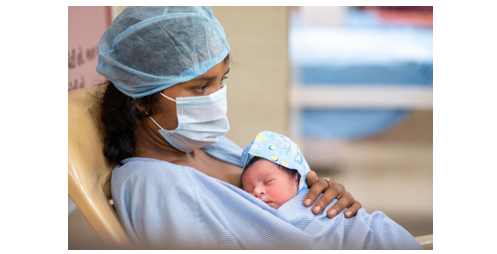
20
Sep
How Can Pregnant Women Protect Themselves from the Covid 3rd wave?
According to experts, India is supposed to experience the COVID third wave by October. Women who are pregnant need to take care of themselves during this time. If pregnant women take all necessary precautions, then they can keep themselves as well as their baby safe and sound. Several well-known celebrities, like actor Anushka Sharma, musician Katy Perry and supermodel Gigi Hadid have given birth during the pandemic.
However, pregnant women must take special precautions. With the high possibility of a third wave coming soon to India, pregnant women must do what they can to protect themselves.
Get your COVID jab immediately
Vaccination is the main way to protect yourself against coronavirus. Pregnant women should be immediately vaccinated. As the disease seems to develop during the second or third trimesters, doctors suggest that women vaccinate themselves at the end of their first trimester.
Dr. Suhasini Inamdar, a Consultant Obstetrician and Gynaecologist from Bangalore, says that pregnant women can get vaccinated any time after the first three months of pregnancy. The first trimester should be avoided as there is no data available regarding the side effects in the early months.
Getting the vaccine has been proven to reduce the severity of the disease. It also lessens the risk of stillbirth and premature deliveries. When it comes to which vaccine you should get, doctors suggest that the best vaccine is the one that is available to you!

Follow COVID norms stringently
Pregnant women have to be careful that they follow COVID protocols. They must take care to wash their hands regularly with soap and water. If water is unavailable, they should use an alcohol-based sanitizer. They should also make sure that they're not unnecessarily touching their face and mouth as that can spread the virus.
Pregnant women should ensure that they’re always wearing a mask while stepping out. Double-masking is essential, and maintaining a 6-feet distance from other people is imperative.
Reduce hospital visits
Pregnant women need routine check-ups and visits with their gynecologists. However, in these times, they must reduce the number of times they leave their homes. Hospitals are high-risk locations. Ask your doctor if any visits can be converted to online appointments.
Whenever possible, go for online consults and video calls rather than in-person visits. To further reduce hospital visits, see if any visits can be clubbed together. If an ultra-sonography can be combined with a routine prenatal check-up, this can reduce the number of times you have to go to the hospital.
Stay home
Pregnant women should avoid leaving their home as much as possible. To protect yourself from the third wave, don’t step out of your house unless necessary. If you have to run an errand, like buying something from the grocery store, wear two masks and maintain distance from all people.
It is better for small errands if a different family member steps out instead of the pregnant woman. This is because pregnant women's bodies are more vulnerable to severe COVID-19.
That’s because of pregnant women’s vulnerable immune systems and also because the virus attacks—the lungs and the cardiovascular system which are already stressed in pregnancy. For this very reason, pregnant women should avoid going out.
Get enough sleep
To protect themselves from COVID-19, pregnant women need to maintain a healthy lifestyle and take care of their immunity. Getting enough sleep is a crucial thing. Pregnant women should ensure that they get at least seven to nine hours of sleep every night.
It’s also important that they should go to bed at a reasonable time. When our bodies are well-rested, they are better able to fight against viruses and diseases.

A healthy diet
What we eat plays an essential role in maintaining our health. For pregnant women, it is all the more necessary that they eat a healthy and balanced diet. They should try to consume food rich in Vitamin C. Vitamin C helps in boosting immunity. Fruits like oranges and other citrus foods are the best sources of Vitamin C.
Pregnant women should also remember to consume leafy greens, veggies, and any source of protein. Apart from that, they should also stay adequately hydrated, especially in humid or hot weather.

Light exercise
Movement is important, even for pregnant women. Pregnant women should avoid strenuous and intensive activity. During the pandemic, pregnant women are advised to stay at home. However, even while isolating at home, one must do some kind of movement.
Light stretching or a walk a day makes a really big difference. It keeps energy levels up and boosts immunity. While exercising, make sure that you're still following social distancing norms. However, if you feel any discomfort or pain while exercising, stop immediately and consult your doctor.
Be informed and have a plan
If you’re pregnant during the pandemic, you should have a plan in place for when you go into labor. Talk to your healthcare provider. Be informed about the COVID-safety measures that they have in place. Make sure your partner or other family members know what to do and what not to do.
Knowing exactly what has to be done during labor, and after delivery eases the stress and anxiety. Having a baby in the hospital can still be perfectly safe even during the pandemic, but be aware of your options.

Following the above recommendations will ensure that pregnant women are protected from the coronavirus. Pregnant women are a vulnerable group - extra care must be taken to protect them. According to the Centers for Disease Control and Prevention (CDC), pregnant women who have COVID-19 are more likely to develop respiratory complications and need intensive care. The second wave in India was harsh on pregnant women, who developed breathing problems and other symptoms.
The CDC has released data that shows pregnant women were 50% more likely to end up in intensive care units. Moreover, pregnant women were also 70% more likely to need ventilators. This data proves that COVID-19 poses special risks to pregnant women.
However, if COVID-safe protocols are followed and the vaccine is taken, there is not much to worry about!
Pregnant women can indeed be safe from the third wave if they take these precautions. They can have a healthy pregnancy and a safe delivery.






